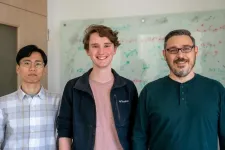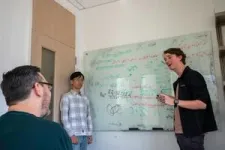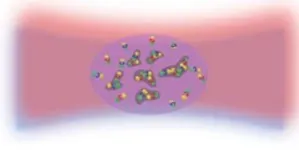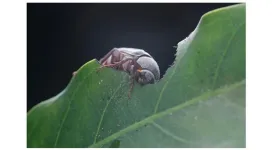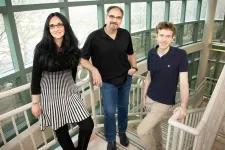(Press-News.org) HOUSTON – (Jan. 18, 2024) – Quantum technologies bring the promise of faster computing, enhanced drug development and new sensing applications. However, quantum behaviors are difficult to study experimentally since most systems can only sustain quantum effects for a short time.
“The reason why quantum physics’ mysterious features tend to vanish so quickly is a process called decoherence,” said Kaden Hazzard, associate professor of physics and astronomy at Rice University and a corresponding author on a study published in Nature Physics. “It occurs when a quantum system interacts with its surroundings and this changes the physics. The bigger the system and the larger the couplings to the surroundings, the more the system will behave in a classical, non-quantum fashion ⎯ and you lose your ability to investigate things at the quantum level.”
Rice scientists and collaborators were able to prolong quantum behavior in an experimental system nearly 30-fold by using ultracold temperatures and laser wavelengths to generate a “magic trap” that helped delay the onset of decoherence. The study is the first experimental demonstration of its kind and provides a new arena to study quantum interactions.
Simon Cornish’s group in the Department of Physics at Durham University in the United Kingdom collaborated with Hazzard and his group at Rice to cool molecules to a billion times below room temperature to create a unique quantum mechanical system. They then set those molecules to rotate quantum mechanically ⎯ a situation analogous to molecules aligning and rotating both clockwise and counterclockwise at the same time ⎯ using microwave radiation.
“When you cool atoms or molecules to these extremely low temperatures, you can control them with light,” Cornish said. “You can actually use lasers to push on the atoms and make them go where you want them to go. You can also use lasers to trap or hold them, and that gives you a level of precision and control that you wouldn’t have normally.”
Generally, the coherence of this rotating behavior in the ultracold molecules decays over a very short amount of time. Before now, the longest recorded quantum state of rotating molecules measured in at 1/20 of a second. Cornish’s group, however, was inspired by theoretical work by Temple University’s Svetlana Kotochigova that suggested a certain “magic” wavelength of light could preserve quantum coherence for a longer period of time.
“Quantum behavior becomes more prominent the colder the system is and brings the quantum behavior to larger length scales,” said Jonathan Stepp, a graduate student in Hazzard’s group. “And having lasers at the right wavelength can ‘trap’ the molecules, so they can rotate in lockstep, which preserves the quantum coherence for a longer time.”
When the group applied this theory in the laboratory as a new experimental technique, they created a “magic trap” which kept the molecules rotating quantum mechanically for a significantly longer time. While Hazzard thought this “magic” laser trap might increase quantum coherence by two- or three-fold, he was shocked to see it kept the molecules uniformly rotating for nearly 1.5 seconds ⎯ a 30-fold increase.
“While I’m not surprised it worked, I’m definitely surprised at how well it worked,” Hazzard said.
Zewen Zhang, another graduate student in Hazzard’s group, said that improved coherence times will allow scientists to study fundamental questions about interacting quantum matter.
“As coherence times become longer, new effects are unveiled,” Zhang said. “We can begin exploring by comparing the experimental measurements to our calculations. Improved coherence is also a step to using ultracold molecules as a platform for various quantum technologies.”
“Even though quantum behavior sounds like a very exotic thing, it’s actually responsible for things we see every day, from how metals conduct electricity to how fusion is produced by the sun,” added Hazzard, who is a member of the Rice Quantum Initiative and the Smalley-Curl Institute. “If you want to make new materials, new sensors or other quantum technologies, you need to understand what is happening at the quantum level, and this research is a step toward achieving new insights.”
The research was supported by the U.K. Engineering and Physical Sciences Research Council (EP/P01058X/1, EP/P008275/1, EP/W00299X/1), U.K. Research and Innovation Frontier Research Grant (EP/X023354/1), the Royal Society, Durham University, the Robert A. Welch Foundation (C-1872), the National Science Foundation (1848304, 1908634), the Office of Naval Research (N00014-20-1-2695), the W.F. Keck Foundation (995764) and the U.S. Air Force Office of Scientific Research (FA9550-21-1-0153, FA955019-1-0272).
-30-
This release was authored by Kayt Sukel and can be found online at news.rice.edu.
Follow Rice News and Media Relations via Twitter @RiceUNews.
Peer-reviewed paper:
Second-scale rotational coherence and dipolar interactions in a gas of ultracold polar molecules | Nature Physics | DOI: 10.1038/s41567-023-02328-5
Authors: Philip D. Gregory, Luke M. Fernley, Albert Li Tao, Sarah Bromley, Jonathan Stepp, Zewen Zhang, Svetlana Kotochigova, Kaden Hazzard and Simon Cornish
https://www.nature.com/articles/s41567-023-02328-5
Image downloads:
https://news-network.rice.edu/news/files/2024/01/231206_Nature-Physics-Paper-with-Jonathan-Stepp-Zewen-Zhang-and-Kaden-Hazzard_gustavo-22-6b301538f3dd14c3.jpg
CAPTION: Zewen Zhang (from left), Jonathan Stepp and Kaden Hazzard (Photo by Gustavo Raskosky/Rice University)
https://news-network.rice.edu/news/files/2024/01/231206_Nature-Physics-Paper-with-Jonathan-Stepp-Zewen-Zhang-and-Kaden-Hazzard_gustavo-15-236603fd4fad45e8.jpg
CAPTION: Kaden Hazzard (from left), Zewen Zhang and Jonathan Stepp (Photo by Gustavo Raskosky/Rice University)
https://news-network.rice.edu/news/files/2024/01/ColdMolecule-99f253ff4c054213.jpg
CAPTION: An artist’s conception of molecules rotating in a quantum superposition in a trap, with clockwise (red) and counterclockwise (blue) rotation rates varying in space. (Image courtesy of the Hazzard Group/Rice University)
Related stories:
Rice helps lead national quantum computing research efforts:
https://news.rice.edu/news/2023/rice-helps-lead-national-quantum-computing-research-efforts
SU(N) matter is about 3 billion times colder than deep space:
https://news.rice.edu/news/2022/sun-matter-about-3-billion-times-colder-deep-space
Links:
Hazzard Group: http://kaden.rice.edu/group.html
Physics and astronomy department: https://physics.rice.edu/
Wiess School of Natural Sciences: https://naturalsciences.rice.edu/
Rice Quantum Initiative: https://quantum.rice.edu/
Smalley-Curl Institute: https://sci.rice.edu/
About Rice:
Located on a 300-acre forested campus in Houston, Rice University is consistently ranked among the nation’s top 20 universities by U.S. News & World Report. Rice has highly respected schools of architecture, business, continuing studies, engineering, humanities, music, natural sciences and social sciences and is home to the Baker Institute for Public Policy. With 4,574 undergraduates and 3,982 graduate students, Rice’s undergraduate student-to-faculty ratio is just under 6-to-1. Its residential college system builds close-knit communities and lifelong friendships, just one reason why Rice is ranked No. 1 for lots of race/class interaction, No. 2 for best-run colleges and No. 12 for quality of life by the Princeton Review. Rice is also rated as a best value among private universities by Kiplinger’s Personal Finance.
If you do not wish to receive news releases from Rice University, reply to this email and write “unsubscribe” in the subject line. Office of News and Media Relations – MS 300, Rice University, 6100 Main St., Houston, TX 77005.
END
Rice research opens new arena to study quantum interactions
‘Magic trap’ preserves quantum coherence in ultracold molecules longer than expected
2024-01-18
ELSE PRESS RELEASES FROM THIS DATE:
For this beetle, ‘date night’ comes every other day
2024-01-18
Life on Earth runs on a 24-hour cycle as the planet turns. Animals and plants have built-in circadian clocks that synchronize metabolism and behavior to this daily cycle. But one beetle is out of sync with the rest of nature.
A new study, published Jan. 18 in Current Biology, looks at a beetle with a unique, 48-hour cycle. The large black chafer beetle, Holotrichia parallela, is an agricultural pest in Asia. Every other night, the female beetles emerge from the soil, climb up a host plant ...
National Science Foundation taps NYU Tandon with $5 million grant to advance accessibility
2024-01-18
A team at NYU Tandon School of Engineering will kick off the second phase of an ambitious research project that aims to transform navigation and accessibility for many of the 285 million people with blindness and low vision (pBLV) worldwide.
The National Science Foundation (NSF) awarded the project a three-year $5 million grant last month.
Led by John-Ross Rizzo – an associate professor in NYU Tandon’s Biomedical Engineering department, associate director of NYU WIRELESS, affiliated faculty at the NYU Tandon Center for Urban Science and Progress (CUSP) and associate professor in the Department of Rehabilitation Medicine at NYU ...
Texas A&M AgriLife Research study may lead to novel obesity treatment
2024-01-18
MEDIA INQUIRES
WRITTEN BY
Laura Muntean
Paul Schattenberg
laura.muntean@ag.tamu.edu
paschattenberg@ag.tamu.edu
601-248-1891
210-859-5752
FOR ...
Semen microbiome health may impact male fertility
2024-01-18
You may have heard about the gut microbiome and its influence on a person’s overall health and well-being. It turns out that the same may hold true for the semen microbiome.
According to researchers from the Department of Urology at UCLA, the semen microbiota might play a crucial role in influencing sperm parameters and enhancing male fertility. Considering recent studies highlighting the microbiome’s significance in overall human health, researchers investigated the semen microbiome to understand its potential impact on male infertility. Exploring the functions of these microorganisms in semen could potentially pave the way for developing treatments targeted ...
South Florida’s nearshore reefs less vulnerable to ocean acidification, study finds
2024-01-18
South Florida’s Nearshore Reefs Less Vulnerable to Ocean Acidification, Study Finds
Results offer a glimmer of hope as climate change impacts coral reefs worldwide
Researchers studying South Florida’s coral reefs found that the region’s nearshore reefs and more sheltered inshore areas are less vulnerable to ocean acidification than previously thought – a major climate-related threat to coral reefs as ocean waters absorb more atmospheric CO2 from the burning of fossil fuels.
This new study, led by scientists at the University of Miami Rosenstiel School of Marine, Atmospheric, ...
Three University of Houston projects included in $17M+ funding for decarbonization and emissions research
2024-01-18
HOUSTON, January 18, 2024 – The U.S. Department of Energy (DOE) recently announced $17.4 million funding for 19 early-stage research projects focused on expanding clean energy technologies at colleges and universities across America. These projects will establish visiting scholars’ programs, create new academic curricula related to geosciences, and provide interdisciplinary training in humanities-driven science, technology, engineering, and mathematics fields.
The list includes three projects from the University of Houston, a Carnegie-designated Tier One Research University. Two of these explore the feasibility and benefit of repurposing ...
Knowing what dogs like to watch could help veterinarians assess their vision
2024-01-18
Ever wonder what kind of TV shows your dog might choose if they could work the remote control? New research from the University of Wisconsin–Madison’s School of Veterinary Medicine provides some answers, but the study was more interested in solving a longstanding problem in veterinary medicine than turning canine companions into couch potatoes.
According to Freya Mowat, veterinary ophthalmologist and professor in the School of Veterinary Medicine’s department of surgical sciences, researchers wanted to determine factors, including age and vision, that influence a dog’s ...
Household income and health insurance among factors in decision to withdraw life support after hemorrhagic stroke
2024-01-18
Living in a high-income neighborhood, having private health insurance, and being older are tied to an increased likelihood that life support will be withdrawn for people who have suffered severe bleeding in the brain, a new study shows.
Led by researchers at NYU Grossman School of Medicine, the study focused on the social and economic factors linked to the withdrawal of life support and related death after being hospitalized for intracerebral hemorrhages. Such bleeds, sometimes referred to as hemorrhagic stroke, often lead to swelling in the brain, which can put a patient into a coma and frequently ...
Xue lab at the CDI publishes groundbreaking insights into memory T cells in Nature Immunology
2024-01-18
The Xue Lab at the Hackensack Meridian Center for Discovery and Innovation (CDI) has made another breakthrough in better understanding, and potentially modulating, the immune system to fight diseases.
The insights into a specific protein and how it regulates the training and efficacy of central memory T cells are published by Hai-Hui (Howard) Xue, a member of the CDI, in the journal Nature Immunology.
The immunological implications could produce better vaccines and cancer treatments in the future, according to the Xue lab, which is also part of the Institute for Immunologic ...
Don’t look back: The aftermath of a distressing event is more memorable than the lead-up, study suggests
2024-01-18
Halfway through a true crime podcast, a morning commuter jerks the wheel to narrowly avoid a collision. When discussing the podcast with a coworker later that day, the driver can easily recall the details of the episode’s second half but retains only a blurry recollection of how it began.
A new study from psychologists at the Beckman Institute for Advanced Science and Technology suggests that we remember the moments immediately following a distressing episode more sharply than the moments leading up to it. Clarifying the relationship ...
LAST 30 PRESS RELEASES:
Scientists discover why we know when to stop scratching an itch
A hidden reason inner ear cells die – and what it means for preventing hearing loss
Researchers discover how tuberculosis bacteria use a “stealth” mechanism to evade the immune system
New microscopy technique lets scientists see cells in unprecedented detail and color
Sometimes less is more: Scientists rethink how to pack medicine into tiny delivery capsules
Scientists build low-cost microscope to study living cells in zero gravity
The Biophysical Journal names Denis V. Titov the 2025 Paper of the Year-Early Career Investigator awardee
Scientists show how your body senses cold—and why menthol feels cool
Scientists deliver new molecule for getting DNA into cells
Study reveals insights about brain regions linked to OCD, informing potential treatments
Does ocean saltiness influence El Niño?
2026 Young Investigators: ONR celebrates new talent tackling warfighter challenges
Genetics help explain who gets the ‘telltale tingle’ from music, art and literature
Many Americans misunderstand medical aid in dying laws
Researchers publish landmark infectious disease study in ‘Science’
New NSF award supports innovative role-playing game approach to strengthening research security in academia
Kumar named to ACMA Emerging Leaders Program for 2026
AI language models could transform aquatic environmental risk assessment
New isotope tools reveal hidden pathways reshaping the global nitrogen cycle
Study reveals how antibiotic structure controls removal from water using biochar
Why chronic pain lasts longer in women: Immune cells offer clues
Toxic exposure creates epigenetic disease risk over 20 generations
More time spent on social media linked to steroid use intentions among boys and men
New study suggests a “kick it while it’s down” approach to cancer treatment could improve cure rates
Milken Institute, Ann Theodore Foundation launch new grant to support clinical trial for potential sarcoidosis treatment
New strategies boost effectiveness of CAR-NK therapy against cancer
Study: Adolescent cannabis use linked to doubling risk of psychotic and bipolar disorders
Invisible harms: drug-related deaths spike after hurricanes and tropical storms
Adolescent cannabis use and risk of psychotic, bipolar, depressive, and anxiety disorders
Anxiety, depression, and care barriers in adults with intellectual and developmental disabilities
[Press-News.org] Rice research opens new arena to study quantum interactions‘Magic trap’ preserves quantum coherence in ultracold molecules longer than expected
